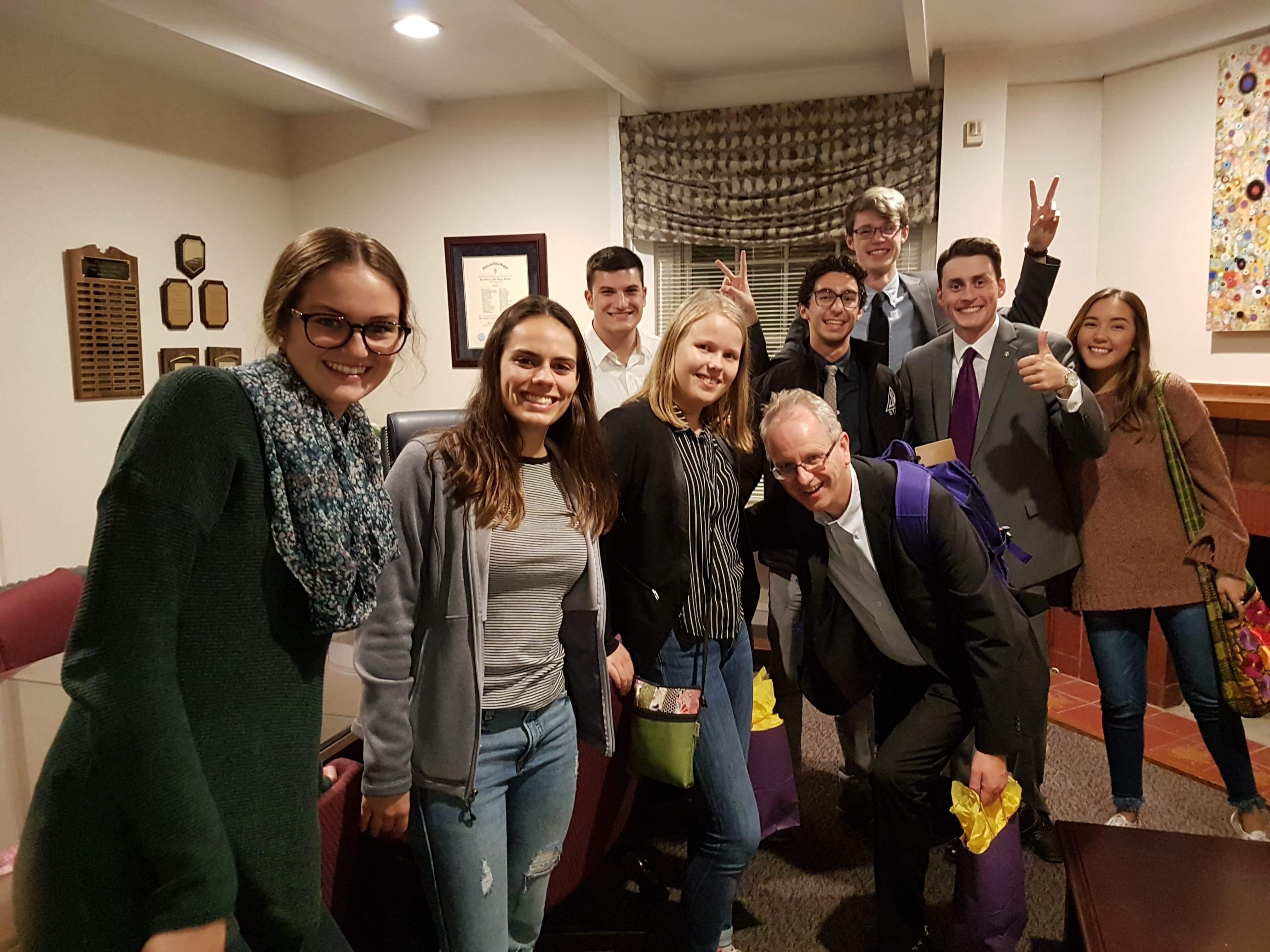On Friday, Sept. 28, member and vice chair of the Norwegian Nobel Peace Committee Dr. Henrik Syse delivered his second lecture at West Chester University. Seeking to dive further into the inner workings of the Nobel Peace Prize picking process, Syse hosted an hour long lecture before fielding student questions.
Matthew Leinhauser, president of the Honors Student Association, introduced him before the lecture, saying that “he is a friend of mine, a friend of West Chester’s, and soon to be a friend of yours.”
True to this statement, Syse’s onstage positivity radiated from the Main Hall lecture stage.
“[West Chester] is one of the only schools where people meet on Friday evenings to hear a lecture; if only Kavanaugh did that,” said Syse for his opening line, later stating “ … that’s my last comment on American politics.”
Multiple times throughout the lecture, Syse made sure to affirm that his thoughts and opinions did not represent the entire committee, but rather just himself – he said this especially after any political opinion or joke.
Syse has worked with the committee for three and a half years. Elected by the Norwegian parliament, five members decide the yearly laureate–a process with some understood weight and pressure. The cultural and political implications of the honor play heavily into the decision-making, as in the case of Liu Xiaobo, a Chinese peacemaker whose prize garnered negativity from the Chinese government.
The lecture itself was divided into multiple primary sections, starting with a brief quiz on recognizable (and some a bit less famous) laureates. Syse emphasized the universality and the range of laureates over the decades, and asked the question,
“How are we to interpret a will written in 1895?”
Many movements that we might now define as promoting worldwide peace were out of the public eye or entirely nonexistent over a century ago; climate change scientists and specialists rank chief among those who don’t meet the original criteria for the peace prize. Syse tied this question with a brief reference to the American Constitution, asking how we can simultaneously honor the past writings while reinterpreting them for a new age.
Utilizing a reference comparing the hair lengths of The Beatles between 1962 and 1970, Syse explained how rapidly a society is likened to change, and how cultural consensus can transform instantly.
He also played with the idea of whether the committee should choose a candidate who matches the world’s voice, or a more controversial candidate who could make a statement. This lead to his next question, “Who deserves the prize?”
Syse discussed the more controversial aspects of the Nobel Peace Prize, focusing especially on the concept of “deserving” the reward. Aung San Suu Kyi, the 1991 laureate, worked as a Burmese peacemaker until assuming a state position in Myanmar; she has drawn criticism for not “living up to the beliefs of a laureate” in relation to her lack of action against Myanmar military massacres. Describing this situation, Syse shared the idea that while the prize cannot be taken back, it can serve as a reminder to who you should strive to be, and where you can fall from.
Alongside this history, Syse mentioned Barack Obama’s Nobel Peace Prize, saying first that it was “certainly a very controversial one,” and continuing to discuss the difference between ‘peace’ and ‘pacifist.’ In his explanation, a Peace Prize can be awarded to a world leader currently at war, an oxymoron of philosophy without taking into account the idea of Just War, saying that “peace without protection of human rights is not true peace.”
After diving into the potential misrepresentations of the Peace Prize, Syse focused more on its unifying ideals for the purposes of “ending on a high note.” He specifically cited the need to take responsibility, the ability to turn enmity into reconciliation and peace and the protection of basic human rights as key components.
Syse ended his lecture with some parting wisdom on power dynamics in modern governments, saying “people have this feeling that power is so far away.” According to the Vice Chair, demagogues will intentionally make citizens feel that their voices are powerless, and that media is a useless tool. Syse urged to fight against this mentality, and to act with purpose to change the world for the better.
When asked a few questions on Syse’s choice to return to West Chester, Leinhauser provided a comment. “[Syse] championed WCU’s work again by stating no other university in the world puts so much care and attention on education of the Nobel Peace Prize than West Chester University, and more specifically, its Honors College. When asked ‘Why West Chester?’ it turns out the answer is pretty simple: No other university in the world is doing what we’re doing.” Dr. Syse made an explicit effort to come to our campus, his only stop between Oslo, Norway and the United Nations meeting.
Leinhauser also shared some preliminary information on the hand that West Chester University has in picking a potential candidate, saying that more will be coming soon. As for endings, Syse had this to say:
“It’s your prize. It’s humanity’s prize. It binds us together. Basic human equality: some would say today a controversial one, but goodness, an important one.”
Max James is a fourth-year student majoring in communication studies with minors in French and creative writing. MJ853459@wcupa.edu.


Comprehensive Mideast Peace Plan found http://mideastpeaceplan.blogspot.com
Mideast Peace Plan letter published in Jerusalem Post 10/10/2016
Feel free to use in the ongoing debate regarding alternative peace plans outside the two-state solution.